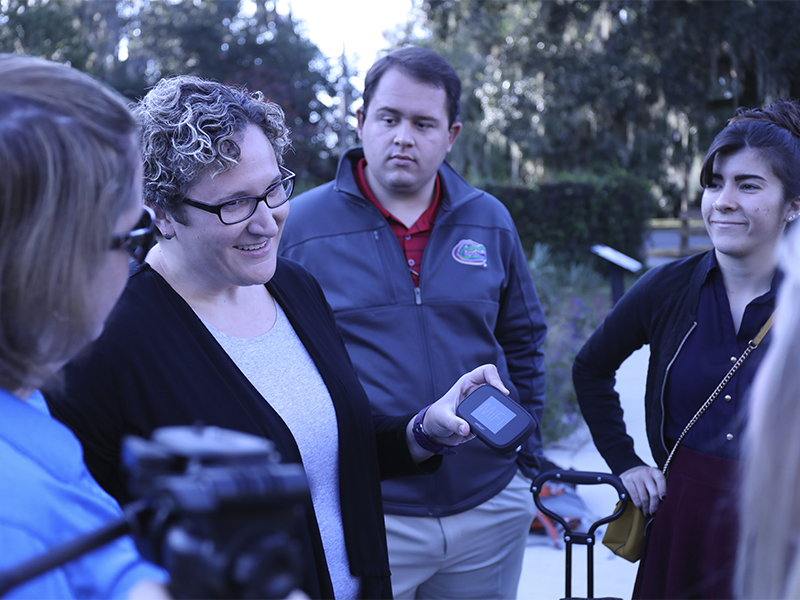GAINESVILLE, Fla. – For Jamie Loizzo, assistant professor in the UF/IFAS department of agricultural education and communication, learning is not confined to the students in her own classroom.
This fall, Loizzo’s graduate-level communication and instructional technologies course through the UF/IFAS College of Agricultural and Life Sciences (CALS) is producing an electronic field trip that brings University of Florida science research to middle and high school students as well as after-school programs. The field trip, titled “Bats and Beyond!”, will be live-streamed on Nov. 15 at 2 p.m. and again at 4 p.m. EST.
This electronic field trip will be live web-broadcasted through Streaming Science, a collaborative effort between the University of Florida’s Institute of Food and Agricultural Sciences (IFAS) and the University of Nebraska-Lincoln.

To date, there are more than 1,400 students registered for the electronic field trip in more than 60 different school classrooms and after-school programs across Florida, Alabama, Oklahoma, Louisiana and Maine. The live-stream video can be watched at this link.
Throughout the fall semester, Loizzo and her graduate students have partnered with the Florida Museum of Natural History for research content. The upcoming field trip will focus on the bat houses found on the university campus and the bat research being conducted.
“I like to make sure our CALS students see the connections between teaching, research and Extension, and apply what they are learning in a real-world context,” Loizzo said. “In this course, they learn about bats, wildlife empathy and informal science communication and education research. They then apply this knowledge as they engage with scientists, write scripts, implement mobile technology and produce a really cool product for middle and high school students who are registered for the electronic field trip.”
The graduate students have been spearheading the production of the electronic field trip. This includes recruiting participants, photo and video editing, directing, mobile web-streaming and assessing participants’ learning and engagement.
“This type of learning is why I came to graduate school,” said Morgan Vance, a graduate student in the class as well as social media coordinator for the project and host for the 2 p.m. segment of the broadcast. “I am a firm believer that full immersion is the best way to learn, and Dr. Loizzo has done just that. This hands-on method of learning allows me to think critically on my own, remember the skills learned to a higher degree, and it has motivated me to learn more about the technologies we have utilized.”
Like Vance, other students in the class serve in roles such as show hosts, field directors and camera operators, among other positions. The entire show will be recorded with iPads. While they learn to navigate the ins and outs of live video production, the graduate students have also been learning about the bat research that happens at the University of Florida.
“Scientific research is vital, but it is worthless if we can’t take the results and communicate them to the public or the intended audience to make a change,” Vance said. “This class has touched on how important it is to take topics and science that are difficult to digest and relay them to different ages, various education levels and people who may have differing viewpoints.”
“Bats and Beyond!” will feature segments with interviews from the Florida Museum of Natural History’s David Reed, curator of mammals; Verity Mathis, collection manager of mammalogy; and Lauren Hammer, a UF doctoral student. Throughout the field trip, students can expect to learn more about the history of bats, their impacts on the environment, and the research that UF scientists are doing with bats in the Bahamas.
“I’m really excited for this project because it creates new opportunities for students at different schools,” Vance said. “Students are no longer limited by a lack of resources for field trips, and it’s live so they get to interact with us.”
###
The College of Agricultural and Life Sciences (CALS) administers the degree programs of the University of Florida’s Institute of Food and Agricultural Sciences (UF/IFAS). The mission of the College of Agricultural and Life Sciences is to deliver unsurpassed educational programs that prepare students to address the world’s critical challenges related to agriculture, food systems, human wellbeing, natural resources and sustainable communities. The college has received more total (national and regional combined) USDA teaching awards than any other institution. Visit the CALS website at cals.ufl.edu, and follow CALS on social media platforms at @ufcals.
 0
0
